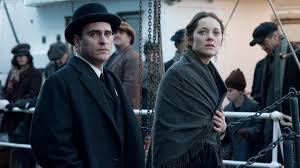
"I am not nothing."
James Gray's The Immigrant (2013) is a remarkable movie, almost an anachronism. It offers the look and staging of Classic Hollywood pictures, mated to the texture and characterizations of a great novel. While not entirely satisfying, its muted elegance is remarkably refreshing.Polish immigrant Ewa Cybulska (Marion Cotillard) arrives in New York in the early 1920s, hoping to meet up with family members. Then her sister Magda (Angela Sarafyan) is quarantined at Ellis Island, while Ewa's family rejects her over an undisclosed transgression. Swooping to the rescue is Bruno Weiss (Joaquin Phoenix), theater impresario and pimp, who recruits Ewa to his business. Ewa resists then reluctantly falls into prostitution, hoping to rescue Magda with the money she saves. Only when she meets Emil (Jeremy Renner), Bruno's magician-cousin, does she consider an alternative path.
Despite its modest 117 minutes, The Immigrant is remarkably ambitious. While Gray most obviously evokes The Godfather, Part II's flashback scenes through its sepia-toned period New York, it has flashes of a Pabst or Murnau melodrama, in its elaborate cabaret scenes, seedy '20s atmosphere and Ewa's moral dilemmas. Gray and photographer Darius Khondji mix honey-colored imagery with careful compositions, always framing Ewa as an outsider: whether glancing through a fogged window or framed in a separate room, she always seems detached from the action. Chris Spelman's lush, evocative score enhances the story's emotional heft.
Gray and cowriter Ric Menello clothe a relatively simple storyline with poignant portraiture. Ewa starts as a naif, clinging to her morality while men around her manipulate her. She lapses into prostitution as a grim means to an end, struggling to reconcile her faith to her profession. She's not given many options: society views her, a foreign woman with a checkered past, as a copulatory aid at best and human refuse at worst. There's no chance for women to escape, outside of marrying wealth (cruelly mocked by Bruno presenting his prostitutes as society girls). Even so, she retains both dignity and autonomy through her struggle, making her sympathetic throughout her plight.
Ewa's male traducers vacillate between abuse, exploitation and affection. Bruno shares Ewa's hardscrabble background, as a Jew shunned by polite society. At best he seems a well-heeled huckster, manipulating Ewa's situation, greasing police palms and treating women as property to bed or exploit as he wishes. Yet he develops a strong attachment to Ewa that inadvertently drives him to redemption. Emil's a comparative cipher, a nice fella who seems to offer Ewa an escape. But it's Emil who triggers the movie's central tragedy, through an impulsive action that leaves everyone in the lurch.
Marion Cotillard gives one of her best performances, mixing brittle vulnerability and surprising inner strength. She often stumbles in her English-language roles, yet her halting delivery and soulful, smoldering looks enhances her characterization. Joaquin Phoenix digs deep into his caddish character to find sympathy and human qualities; his selfish, agonized turn to redemption recalls Rod Steiger in Doctor Zhivago. Jeremy Renner makes an effective straight man, making Emil a likable con with an edge.
Admittedly, The Immigrant's somewhat rough in its plotting, drifting from scene to scene without strong flow, with a drawn-out finale that seems underwhelming after the climax. Even these faults add to the film's alluring atmosphere. In its style, tone, deliberate pacing and classical staging, it's the kind of movie rarely seen in today's Hollywood.

